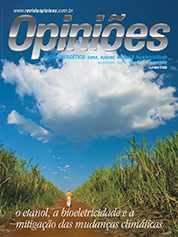Kees Pieter Rade
Ambassador of The Netherlands to Brazil
Op-AA-22
The meaning of biofuel in the bilateral cooperation between Brazil and The Netherlands
The European Union adopted a policy on the climate, in which sustainable energy plays a relevant role. One important item of this policy is the ambitious objective to achieve a 10% reduction in carbon di-oxide emissions, in the transportation sector, by 2020. Certainly, for the most part, this objective will be attained with biofuel.
Due to the less favorable climate and limitations in the availability of land, Europe will never be able to self-supply its demand for biofuel; the import of biofuel will be necessary to comply with said objective. At the end of 2008, the European Union established a directive for biofuel, by which member states will be obliged to mix a certain percentage of biofuel to fossil fuel. In 2020, this percentage figure is expected to be 10%.
Since the 70’s, Brazil has adopted an active policy with respect to the production of biofuel in the country. This biofuel comprises mainly bioethanol, produced from sugarcane, and biodiesel, produced from soya. One may add that Brazil set up not only a production and distribution infrastructure, but also developed and produced cars powered with biofuel.
Currently, Brazil produces a large volume of bioethanol, allowing it to export some of its production. The Brazilian government is planning to increase the production of biofuel to reach a grand scale in a few years, so that a larger volume of bioethanol may be exported, for example, to Europe, where the demand for biofuel, due to the directive established by the European Union, will more than double in the next few years.
The port of Rotterdam is the largest in Europe and complies with all the requirements to become the main port of access for Brazil on the European continent. The intention is that the distribution of bioethanol will take place from Rotterdam to all of Europe. There is a very big public interest in biofuel in The Netherlands and in Europe with respect to the sustainability of bioethanol production.
If in The Netherlands we want to contribute to decreasing CO2 emissions by mixing bioethanol to gasoline, or biodiesel to diesel, we can only accomplish this if we know that the biofuel was produced in its country of origin in a sustainable manner. Thus, The Netherlands and Brazil share interests in the field of biofuel. The Netherlands want to play a relevant role in supplying biofuel to Europe, and through The Netherlands, Brazil can gain access to the European market.
This shared interest of the two nations was the reason for their signing a mutual cooperation agreement in April 2008, covering the sustainable production of biofuel in Brazil and the world. One of the items of this mutual cooperation agreement set forth the establishment of a bilateral workgroup, comprising government representatives, which will schedule activities and undertake to implement them. Said workgroup will comprise specialists representing a broad range of disciplines.
The production of biofuel involves economic, social and environmental aspects, whereas each entails its own perspective. The Netherlands are of the opinion that, apart from the exchange of knowledge about current affairs, the main issue is the promotion of a better view of the contemporary situation of Brazil and The Netherlands, and also understanding the points of view that these two countries have on the issue of sustainability.
In addition, the workgroup also has the objective of facilitating the export of sustainable biofuel, duly certified, to The Netherlands. The above mentioned bi-national workgroup met in September of this year in The Netherlands to discuss the issue of bioethanol sustainability, in a workshop attended by the participants.
Brazil had no less than twelve representatives. In the workshop, there were representatives of The Netherlands, such as from NGOs, research institutes, certification entities, industrial and commercial companies, as well as government representatives. On that occasion, Brazil submitted recent development policies in Brazil, which were jointly discussed, such as the Agro-ecological Land Zoning (“AEZ”), the National Commission for the Development of Working Conditions in the Sugarcane Activity and the Indirect Change of the Use of Land issue (“ILUC”).
“ILUC”, as a consequence of the expansion of the biofuel area, is a problematic issue that is as yet not covered in the European Directive. Both The Netherlands and Brazil share the same opinion, according to which the production capacity may not result in the shrinking of biodiversity, nor in the reduction of tropical forest areas.
The exchange of knowledge about “ILUC” contributed to the better understanding of the subject matter by both parties. Brazilian bioethanol ranked very well on the sustainability scale; issues pertinent to sustainability will initially be concentrated on the production of other types of biofuel. However, attention will continue to be focused on bioethanol, on which the two countries agreed that there is a need to improve the instruments used, so as to better study all aspects relating to “ILUC”.
For 2010, several activities are planned, in which the useful cooperation between Brazil and The Netherlands may again be highlighted. We share a common interest in a cleaner world. Certainly, at the Copenhagen Conference, we will have to optimize our efforts to, through this type of cooperation, bring about a better climate.




